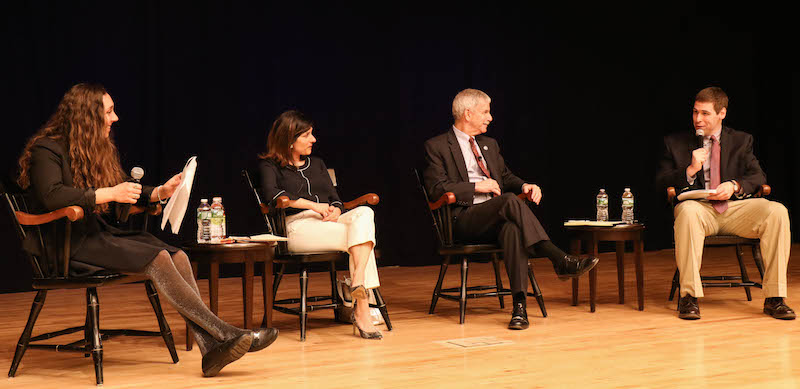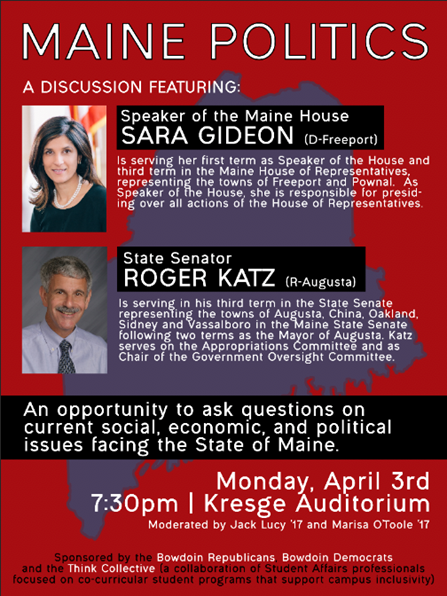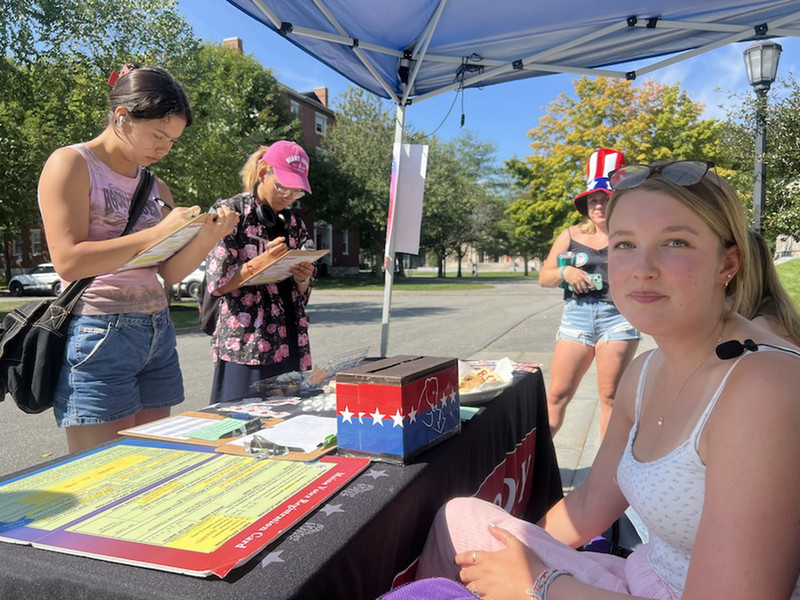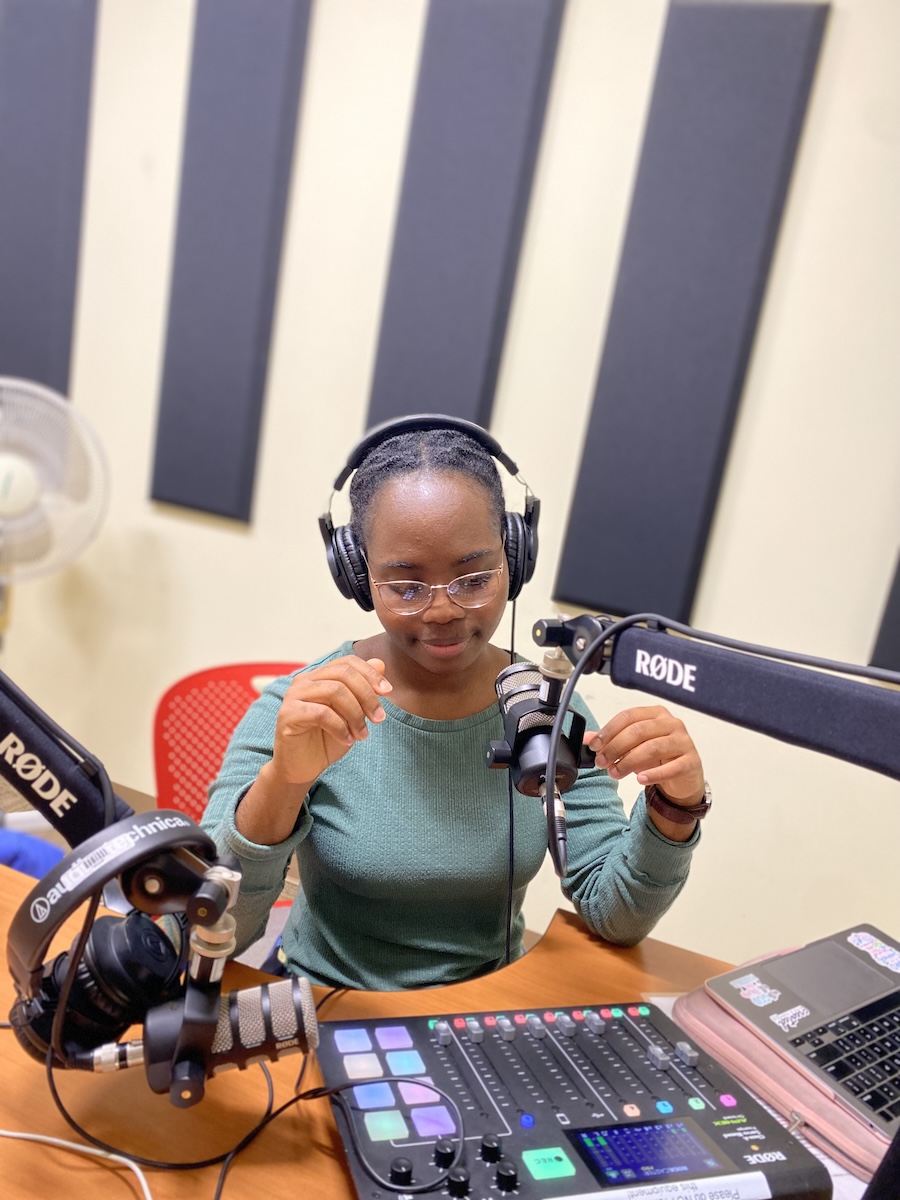Two Maine Politicians Discuss State Issues — And Set an Example for Bipartisanship
By Rebecca Goldfine
Given the current political climate, the Maine Politics talk Monday night was perhaps most notable for the amount of bipartisan agreement and respectful cordiality shown by the two political guests and two student moderators.
Jack Lucy ’17, president of the Bowdoin Republicans, and Marisa O’Toole ’17, president of the Bowdoin Democrats, moderated the discussion in Kresge Auditorium. This is the second campus event the two students have recently worked on together — the first was the February faculty panel, “Looking Ahead to the Trump Presidency.”
For the Maine Politics discussion, Lucy and O’Toole — who both grew up in Maine (in Orono and Scarborough, respectively) — invited State Sen. Roger Katz (R-Augusta) and State Rep. Sara Gideon (D-Freeport) to Bowdoin to speak on a range of topics. Among other issues, Katz and Gideon discussed the opioid epidemic in Maine, Maine’s worsening labor shortage, and the merit of citizen-initiated ballot questions.

Katz and Gideon were on the same page about these topics — and on a few others. At one point Katz exclaimed, “We need to find something to disagree about!”
Gideon, of course, agreed with him on this point. She noted that in our increasingly polarized society, she feels a responsibility to collaborate with her Republican counterparts. “I would choose to work with Roger [Katz] on any project, any day, and I think that if put our heads together we come out with better policy,” she commented.
The seed for the Maine Politics event came out of discussions among members of a new campus group of Student Affairs staff called “thInk Collective,” which is trying to develop more student programs that “bolster and broaden” inclusivity and diversity, said Kate Stern, director of the Resource Center for Sexual and Gender Diversity and associate director of Student Affairs. “There is a capital “I’ in thInk for inclusivity. While the group may develop programs collectively, it also serves as a sounding board for idea development, and most importantly it is a place for intentional collaboration,” she added.
Below are a three areas Gideon and Katz touched on:
Opioid addiction in Maine
The first question O’Toole asked the two politicians was what state government was doing to stem Maine’s rising rate of overdose deaths. Gideon answered frankly: “The state does not have enough resources in place” to tackle the problem, though she said legislators have appointed a task force to recommend specific actions the state can take.
Katz acknowledged the role he and his fellow representatives played in abetting the public health crisis. “We helped create the problem as a legislature because we passed laws to make it much more difficult for people to get their hands on prescription medicine,” he said. “The unintended consequence was that people who had significant pain issues who could no longer get access to prescription drugs…turned to other forms of opioids, which in Maine primarily means heroin.”
The dilemma that policy makers face, Katz explained, is that Maine and other states are just beginning to learn what actions work when it comes to quelling widespread addiction. “We don’t want to throw our money into something that is not effective,” he said.
Maine’s job shortage:
Again, Katz and Gideon were in agreement that Maine is facing a dire situation as more of its residents age and not enough younger workers step up to replace them.
“Maine is the oldest state in the country, and if we continue in this direction, we will have fewer and fewer workers supporting more and more older people,” Katz warned.
Maine could do one of three things to reverse this trend, he continued. The state could make child birth more appealing, perhaps by giving tax breaks to growing families, or it could do a better job of keeping young people in the state. Its third and perhaps most viable option is to encourage more people — including foreigners — to move here, “whether they are from Ohio, Idaho, or Burundi,” Katz said.
Unfortunately, “the political environment right now for moving in that direction is terrible,” he said. “And our chief executive is not being very helpful, frankly, in trying to put out the message that Maine is open.”
“This is not a partisan issue,” Gideon emphasized. “Bringing people to Maine is so, so important. But so is looking at people who are living in Maine and who are ready to be retrained and who want to go back to school, but who are struggling to put food on the table and also find a way to go to school.”
In the end, Gideon said “these are solvable issues. We have the tools to do it, we have to come together and implement the policy that will let those things happen.”
Citizen Referendums:
In the 2016 election, Maine voters were faced with several rather dramatic policy proposals, including whether to make recreational marijuana legal, to tax incomes over $200,000 to support public K-12 schools, to increase the state’s minimum wage, and to step up background checks on gun buyers.
Katz and Gideon both said the citizen referendum process in Maine is problematic (Katz said “it is completely broken” and has veered from its original intention).
Maine is one of 25 states with popular referendums. “Citizen-initiation processes were created to give regular people who didn’t think the legislature was doing its work the ability to create laws themselves, to work around lobbyists and special interest groups,” Katz said.
He said on many of the 2016 ballot issues — particularly legalizing marijuana, passing an income education tax, and implementing more background checks on gun sales — prompted a huge influx of out-of-state money to pay for aggressive advertising. He added that the proposed laws often have unintended effects that get overlooked or drowned out during the campaign season.
“Part of it is our fault,” Katz said. “We didn’t solve the minimum wage issue, for example. But there is a reason we [legislators] spend so much time agonizing over these bills. There are many ways to look at these issues, particularly tax policy.”
There are three proposed bills at the state house to change the citizen referendum process, Gideon said. “It is not the best way to govern,” she argued. “I don’t want to take the referendum process away, but…we can look at it and consider how to make it better and how to ensure it’s working to benefit all Maine people.”



